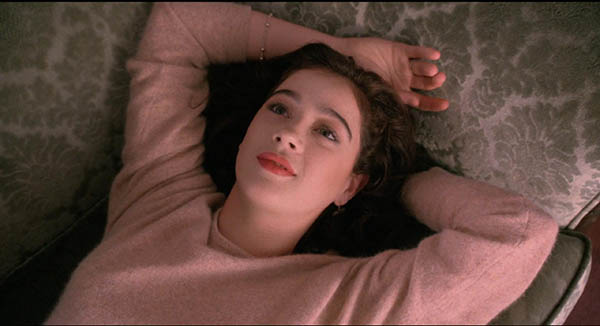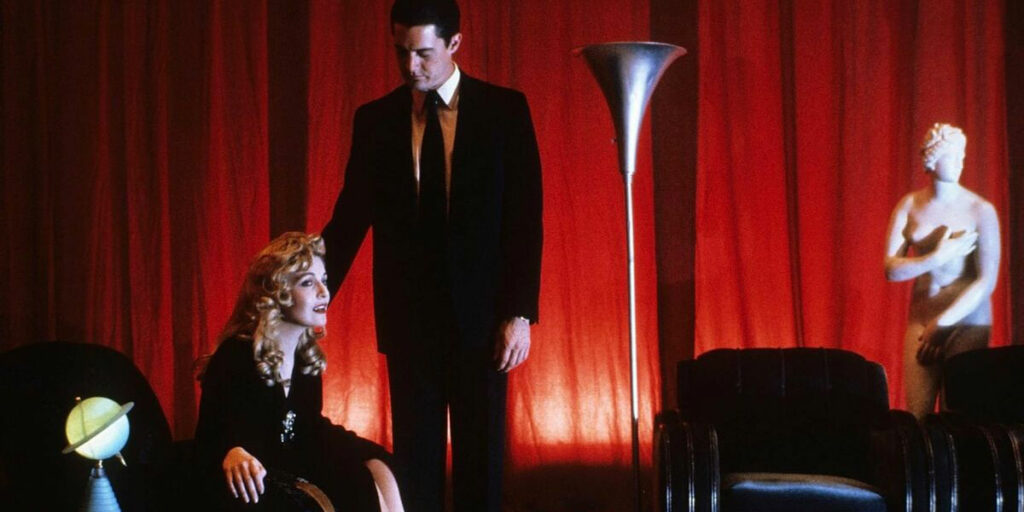David Lynch’s Fire Walk With Me, the controversial part-prequel, part-sequel to Twin Peaks, is a chilling and enthralling journey towards inescapable tragedy.
The opening credits are overlaid upon the image of television static; the camera moves away gradually, and we see someone destroy the TV with a weapon. The meaning of this image is pretty simple: what we’re about to see is meant to be cinematic, and not just an extended episode of Twin Peaks. Where a director like Michael Haneke (The Piano Teacher) frequently uses television screens in the centre of frame to quietly comment on the sensationalism and dishonesty of the mainstream media, Lynch’s intro is a truly bombastic rejection of the platform that communicates total contempt. Surely the Cannes crowd, who are purported to have booed the film by the end, were thrilled by this.
Structurally, the film is completely unlike any episode of Twin Peaks. Episodes in the original 1990-1 run flitted between scenes depicting the affairs of the many quirky, mysterious, but thoroughly endearing inhabitants of Twin Peaks, a largely harmonious community which has been shook by the murder of a 17-year-old homecoming queen. The first half hour or so, like the series, is built on an FBI investigation around a murder (this time, the new character of Teresa Banks rather than Laura Palmer) in a small Washington town. We briefly come across characters from the series, such as Agents Dale Cooper (Kyle MacLachlan, Inside Out), Gordon Cole (David Lynch, Nadja) and Albert Rosenfield (Miguel Ferrer, RoboCop), and one of the scenes in an FBI office features a brief appearance by David Bowie (doing an abysmal American accent) as Agent Phillip Jeffries, who babbles about seeing unusual spirits, and is supposedly an old colleague of these agents.
The strongest part of the film is the middle section, which is an account of Laura Palmer’s final days. Of course, her murder was the central storyline for the first half of the series, but the series was ultimately about the human condition, the diversity of personalities that comprise a small community, and how said people respond to grief – we actually don’t learn a lot about Laura over the course of 30 episodes. For the first time, Sheryl Lee (Winter’s Bone) is finally allowed to take centre stage, and her performance is totally absorbing. Moira Kelly (The West Wing) replaces Lara Flynn Boyle (Happiness) as Laura’s best friend Donna Hayward, and I will go against the grain by saying that she is far better in the role despite her limited screen time. We gradually learn more and more about Laura’s life, including aspects that were merely hinted at in the series, and as the mystery unfolds, we get a picture of a tragic, short life with no apparent salvation or reward.
The third and final section of the film is the only part that can really be spoiled, so I won’t say anything. It’s certainly very satisfying, though…

It’s a very ambitious film – attempting to tie up some loose ends, introduce a few more and tell a story whose ending is already common knowledge. Twin Peaks: Fire Walk With Me is about the journey, not the destination. Some factions of our society, and certainly the mainstream media, treat murder victims as a simple statistic that can be shaped and sensationalised until the story is no longer ‘useful’. This film attempts to give a voice to a person whose life was plagued by tragedy, despite an idyllic–looking upbringing. Like the way in which cruelty lies underneath an uncannily harmonious town in Blue Velvet (1986), Lynch explores the relationship between perception and reality. Every time he presents a town, village or community of friendly people, bounteous front gardens and unblemished sunlight, there is always something nasty lurking underneath. If something sounds too good to be true, then it probably is.
Twin Peaks: The Missing Pieces is the other side of the same coin – the side that was face down on the floor for 22 years. Released in 2014 on the series’ Blu-Ray set, it is a compilation of about 90 minutes of deleted and extended scenes. Bowie fans will be pleased to learn that Jeffries appears a bit more prominently, and there are a plethora of scenes that wouldn’t seem at all out of place from the series. One highlight is when Leland Palmer (Ray Wise, Cat People), Laura’s father, teaches his wife (Grace Zabriskie, Big Love) and daughter some basic Norwegian. The levity would perhaps seem a bit out of place in the main feature, and the final cut runs for over two hours so it was inevitable that interesting material was going to be cut. It’s still essential viewing, and features many characters that were cut outright from the final cut of Fire Walk With Me.
Fire Walk With Me was slated by Western critics when it came out, but the large contingent of Twin Peaks fans in Japan were always ardent champions of it. Narratively, focusing on the domestic life of a teenage girl was always going to seem like a regressive bathos for the big-screen outing of a series cancelled because of plummeting ratings, but it’s perfectly fitting because it’s ultimately still so true to the series’s spirit. Twin Peaks, despite being co-created by a successful television writer in Mark Frost (whose part in making the series is still largely unrecognised relative to Lynch’s), was never very mainstream. Granted, its pilot and first season brought ABC gigantic ratings, but they were never going to last, especially as it became more and more apparent that the murder mystery was more of a narrative segue into learning about the rest of the characters rather than the main focus of the series. The network forced Lynch and Frost to reveal Laura’s killer prematurely, and after this point, viewership completely tailed off.
If you’re wondering about which order to watch the content in, it’s quite simple: just follow release order. Pilot first (avoid the extended European version for now as it contains spoilers for season 2; it’s a long story), season 1, season 2, Fire Walk With Me, The Missing Pieces, The Return. There are three canonical tie-in novels, though none are necessarily essential to understanding the events of the series and film: The Secret Diary of Laura Palmer (1990) by Jennifer Chambers Lynch was published between seasons 1 and 2, The Secret History of Twin Peaks (2016) goes right before The Return, and The Final Dossier (2017) is after The Return. The latter two books were written by Mark Frost.
Twin Peaks: Fire Walk With Me is now available to watch on digital and on demand.

